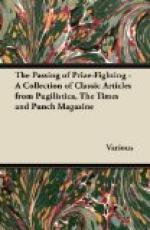Meanwhile, what became of the boys whose nest was thus invaded? (The Girls’ School and Babies’ Montessori School is half-a-mile away.) They immediately showed what they are made of by themselves erecting on the ground beside the windmill a series of Kitchener huts. There they sleep and eat, coming hobbling down to headquarters for carpentering and to perform their strange new duties as guides, philosophers and friends.
Another development in the Chailey scheme of altruism that arose from the War was, as readers of Punch will no doubt remember, the sudden establishment of the St. Nicholas Home for child victims of the air-raids. So sudden was it that within seven days of the inception of the idea a house had been found and furnished, a staff engaged and a number of the beds were occupied. Here, throughout the last years of the War, terrified children were soothed back to serenity and a sense of security in the sky above.
And now for “Botches.” It had long been one of the many aspirations of the founder of the Heritage Schools, and the founder also of the Guild of Brave Poor Things and the Guild of Play—Mrs. C.W. KIMMINS—who in her quiet practical way is probably as good a friend as London ever had—it had long been one of her dreams that the word “cripple” should be enlarged from its narrower meaning to include the crippled mind no less than the crippled limbs. In her work in Southwark, where the Guild of the Brave Poor Things began, she has seen too many children stunted and enfeebled by lack of pure food and fresh air, who would under better conditions grow naturally into health and strength and even power: “little mothers” taxed beyond their capacity by thoughtless parents, and all the other types of “cripple” which the mean streets of a great city can only too easily produce. If a house at Chailey or near by could be found or built where this wasted material might be nourished into happy efficiency, how splendid! Such was the desire of the founder, and it is now within sight of fruition; for, through the generosity of a friend of the Heritage, the house has been acquired and is ready for occupation.
Strange are the vicissitudes of fortune; stranger the links in the chain of life. CLAUDE and ALICE ASKEW, who wrote popular serial novels in the daily papers, lived in a rambling old home at Wivelsfield Green, in Sussex, known as “Botches.” This they enlarged and modernised; they developed the gardens and filled the grass with bulbs. Then came the War. Mr. and Mrs. ASKEW threw themselves into foreign work, and on one of their voyages were drowned through an enemy torpedo, and “Botches” became tenantless. It is “Botches” which has now been given to the Heritage for the reception of Southwark children.




